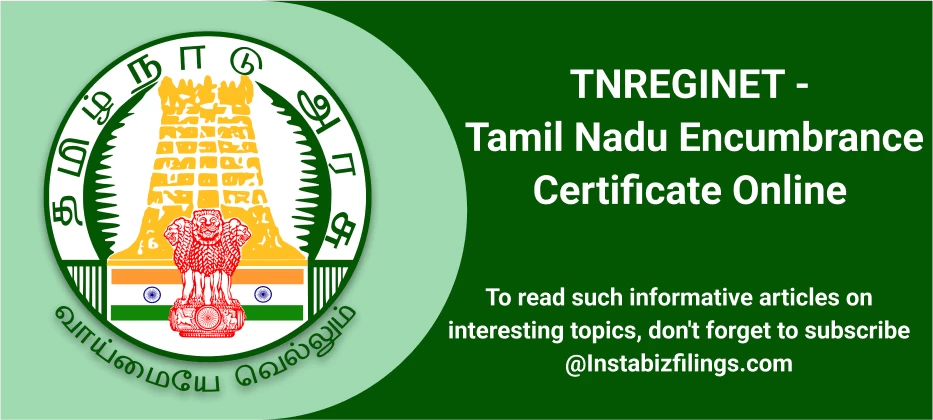
TNREGINET - Tamil Nadu Encumbrance Certificate Online
November 24, 2025 by Team Instabizfilings
Introduction to TNREGINET
The Tamil Nadu Registration and Stamps Department has simplified the procedure of getting the Encumbrance Certificate (EC) of citizens through an online portal known as TNREGINET (Tamil Nadu Registration Government Network). This e-government portal enables the citizens to get a number of services associated with property registration such as accessing Encumbrance Certificates which are important documents in property transactions.
What is an Encumbrance Certificate?
A legal document that gives a record of all transactions or encumbrances that are related to a property is known as an Encumbrance Certificate (EC). With such a certificate, the amount of financial and legal liability will be confirmed as zero on the property. The following are some of the purposes under which it is regularly needed:
-
Property Sale: To ensure that the property is not mortgaged or liened.
-
Home Loan: To demonstrate the ability to legally mortgage the property to a bank or a financial institution.
-
Transfer of Property: To give effect to the history of the ownership of a property.
The Encumbrance Certificate typically contains details such as:
-
Ownership history.
-
Information on any mortgages, loans or court proceedings concerning the property.
-
A statement as to whether the property is encumbered or not.
How to Get an Encumbrance Certificate in Tamil Nadu (TNREGINET)?
The process of obtaining the Encumbrance Certificate through TNREGINET is simple and can be done in a few easy steps.
- Step 1: Visit the TNREGINET Portal
-
Go to the official website of TNREGINET: https://tnreginet.gov.in/
- Step 2: Register or Log In
-
As a beginner user, you will be required to create an account by giving your personal information such as name, address, email and so on.
-
In case you are already registered, then just log in with your account.
- Step 3: Navigate to the Encumbrance Certificate Section
- After logging in, go on the dashboard to the Encumbrance Certificate portion.
- Step 4: Provide the Required Details
-
Property Details: Contain location and the type of the property.
-
Document Number: This is the document that is registration of the property.
-
Period of Encumbrance: Enter the encumbrance certificate period you desire.
- Step 5: Payment of Fees
After filling all the details, it will be time to pay the certificate. One can pay the fee online through a credit card, debit card or net banking. The charge will be as follows:
-
For Online EC: There is a nominal fee per number of years of record.
-
For Physical EC: Cost can be determined by the nature of the certificate required.
- Step 6: Download the Encumbrance Certificate
- The Encumbrance Certificate shall be generated after the successful payment. You are able to download the certificate as a PDF file and print it out.
Benefits of Using TNREGINET for Encumbrance Certificate
-
Convenience: It helps to save time and effort since it is possible to access and obtain an Encumbrance Certificate online without visiting the sub-registrar offices.
-
Instant Access: The portal provides the opportunity of issuing the certificate immediately, which is particularly important when one needs to carry out an urgent property transaction.
-
Transparency: All the information on the encumbrances of the property is clearly indicated and there are no hidden liabilities.
-
Cost-Effective: The online service would be nominal compared to the traditional ways.
Types of Encumbrance Certificates Available
-
Form 15 (For Property Transaction Records): This certificate is used to document the particulars of the property transactions, i.e., property transaction that takes place through sale, gift, or mortgage.
-
Form 16 (For Mortgages): In case you have to display the mortgage history of a property, then use this form.
-
Form 17 (For Legal Claims): In case there are any legal claims, disputes or cases which refer to the property, this form will give details concerning the legal claims or cases.
Conclusion
TNREGINET portal has simplified the procedure of issuance of Encumbrance Certificates to property owners in the state of Tamil Nadu. It provides a convenient and time-saving system, which enables people engaged in the processes of property turnover to spend less time and energy. When purchasing, selling, or mortgaging a property, an access to a transparent and certified Encumbrance Certificate is an ingredient of ascertaining that the property was devoid of any legal encumbrance.
Disclaimer
The information provided in this blog is purely for general informational purposes only. While every effort has been made to ensure the accuracy, reliability and completeness of the content presented, we make no representations or warranties of any kind, express or implied, for the same.
We expressly disclaim any and all liability for any loss, damage or injury arising from or in connection with the use of or reliance on this information. This includes, but is not limited to, any direct, indirect, incidental, consequential or punitive damage.
Further, we reserve the right to make changes to the content at any time without prior notice. For specific advice tailored to your situation, we request you to get in touch with us.

Need more details? We can help! Talk to our experts now!
Start Your Business Registration – Talk to Our Experts Now!

Still Confused?
Talk to experts? Fill in the information and we will reach out in 24 Working Hours.

